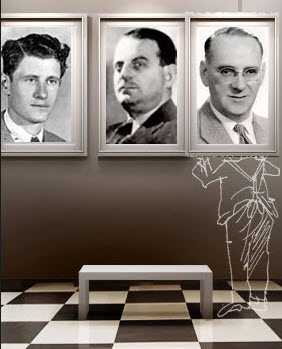Arthur Weisz (1897-1945)
After completing his studies in the industrial production of glass, Arthur earned a degree in commerce. During World War One, he served in the cavalry and the artillery corps and received an honorable discharge with many citations for outstanding service. In the 1930’s, he took over the management of the family’s glass factory. His two brothers, Vilmos and Viktor, also worked at the factory. Three other brothers had already made Aliya. The glass factory had wide-ranging international connections, but ceased its operations in the summer of 1944 due to the persecution against the Jews. On 1 January, 1945, Arthur Weisz was “taken for questioning” by Arrow Cross soldiers and disappeared without a trace.
Miklós Moshe Krausz (1908-1985)
Administrator. Moshe studied at the yeshiva in Miskolc and completed his secular studies on his own. In 1932 he was appointed as the general secretary of the religious Zionist Mizrahi movement. In 1934 he was hired as secretary of the Eretz-Israel (Palestine-Palmut or Palamt) Office in Budapest and was its administrative manager from 1938 to 1946. After the liberation of Europe in 1945, Moshe made Aliya and became the manager of the Swedish Village and then a senior clerk at the Ministry of Social Welfare until he retired.
Mihály Menahem Mendel Salomon (1897-1991)
Mihály’s father Moshe was the chief rabbi of Zilah (Zalåu) before the family moved to Budapest. He was deported to Bergen-Belsen concentration camp. After the war he made aliya and died in Israel in 1955. Mihály’s mother, Sarah Engel, died in Budapest in 1920. He studied education at the Jewish teachers seminary in Budapest, and philosophy at Budapest University. He taught for about a year and a half and then went into business, as a textile merchant. In 1923 he married Margit-Mirjam Knepler. They had a son, Otto-Asher. Mihály held various leadership positions in the religious Zionist movements from the 1930s onward, and was a member of the Eretz-Israel (Palestine-Palmut or Palamt) Office’s auditing committee. In that capacity he became the manager of the Glass House. In 1946-48 he served as president of the Zionist Federation in Hungary, as vice president of the Orthodox Jewish community in Pest and on the executive board of the Joint Distribution Committee.
In 1949 he made aliya and became one of the editors of the Új Kelet daily paper in Tel-Aviv. From 1951-1953 he was the editor-in-chief of Népünk (Our Nation). During that same period he served for a short time as the spokesperson for the Post Office. In the early 1980s he wrote articles that were published in Új Kelet.
Sándor Groszmann Ben Erec – Alexander Grossmann (1909-2003)
Journalist and publisher. From a family of merchants in Miskolc. He studied at a yeshiva and from his youth was Zionist movement leader. In 1944 his family was deported to an extermination camp, but he escaped. He was captured and sent to Kistarcsa detention camp. In September 1944 he was released and from the end of October was a member of the management of the Glass House. In November he moved to the Wekerle Sándor St. branch of the Swiss consulate, to manage the day-to-day life of the Jews refugees there. After the war he was an executive member of the Joint Distribution Committee and worked hard to create workplaces for unemployed Jews. He left Hungary in 1949, arriving in Israel after three months in Vienna. He lived on a kibbutz for two years and moved to Paris and later to Geneva, Switzerland where he became a book publisher and edited the periodical “Jövő” (“Future”)
Simha (Sándor) Hunwald (1914-1945)
Simha was born in the city of Kolozsvár (Cluj) and his family moved to Budapest in 1921. In 1931 he joined the Zionist movement, resulting in him being expelled from the Jewish high school. In April 1942, with the beginning of the deportation of Jews from Slovakia, he organized the absorption of the escapees into Hungary, giving them the identity cards of young Hungarian Jews. The capture of one of the refugees led the police to him. Hunwald was sent first to Garany detention camp, and then to the Ukrainian front, with a forced labor unit. In 1944 he took advantage of the collapse of that front and fled. He was caught at the Hungarian border and sent back to the front. In October he escaped again, and this time reached Budapest and joined the operations of the Glass House. He adopted the name Hans Kühne, a clerk at the Swiss legation, and used the car provided to him by deputy Swiss consul Karl Lutz, to distribute forged documents to the persecuted Jews. In the early days of 1945 he was arrested at the gate to the Glass House. His captors took him to the basement of the Ministry of the Interior, where he was tortured and murdered. In 1947 he was posthumously awarded the Order of Merit of the Republic of Hungary. When Hashomer Hatzair reorganized in Hungary 1945, its first meeting hall was named after Simha Hunwald.
Albert Geyer (1895-1962).
A lawyer, who specialized in international law and insurance. In 1944 Albert was the Zionist delegate to the board of governors of the Jewish Community in Pest. In 1945-1946 he was the President of the Hungarian Zionist Federation, and was a member of the Joint Distribution Committee’s Presidium from the end of WWII until 1948. He was Chairman of the Hungarian Chapter of the World Zionist Congress until 1950, when he emigrated.
Fábián Herskovits (1907-1982)
Teacher and rabbi. He obtained his PhD at the Faculty of Philosophy at Budapest University, and was ordained at the rabbinical seminary in Budapest. In the 1930s he taught at the University of Rome and Tel Aviv University, and from 1941, worked as a rabbi in Budapest. In 1947, he was awarded the Order of Merit of the Republic of Hungary. He left Hungary in 1949 and headed the Department of Culture in the Tel Aviv Municipality. In 1981-82 he was President of the World Association of Hungarian Jews.

